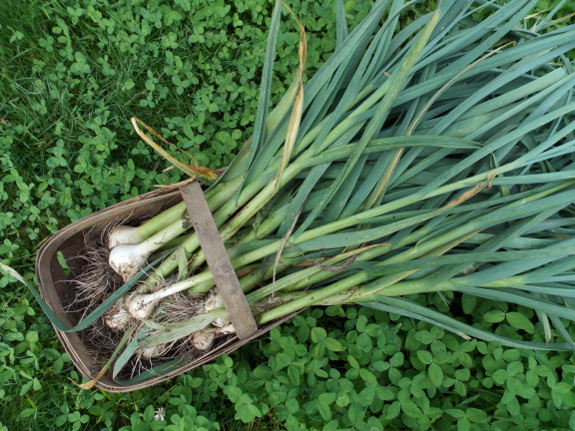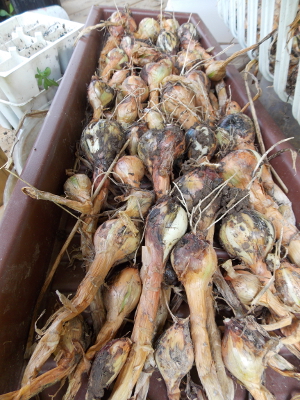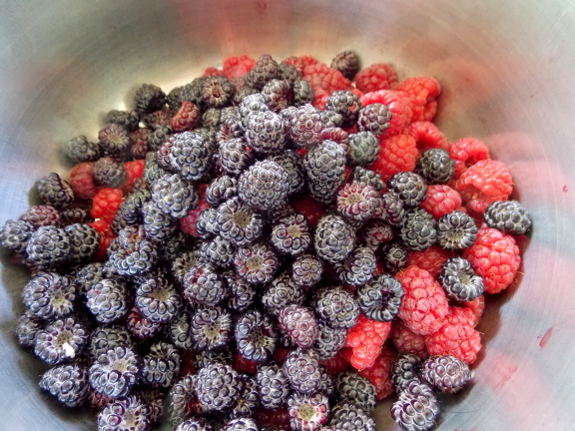
A mediocre allium year

Two
weeks ago, I harvested our Italian Softneck garlic, and this week the Music
and Silverwhite Silverskin were finally ready to join their
precocious siblings on the curing racks. It's shaping up to
be a mediocre year for alliums, probably because of a cold winter,
lack of sun during the critical bulking up period this spring, and
perhaps mineral
burn.  Although I'm a bit disappointed that my
garlic heads are only 75% to 100% as large as storebought rather
than 100% to 200% as large, we plant extra to hedge our bets, so
we'll still enjoy a garlicky season.
Although I'm a bit disappointed that my
garlic heads are only 75% to 100% as large as storebought rather
than 100% to 200% as large, we plant extra to hedge our bets, so
we'll still enjoy a garlicky season.
Half of the potato
onions were also ready this week (with the ones closer to the
shady hill needing a bit more time). Again, the bulbs were
smaller than last
year, but
larger than the year before when I gave
up on one variety and changed
over to this one.
With the curing racks completely full of garlic, I had to cobble
together makeshift arrangements for the onions. Most went
into old freezer baskets propped off the ground, but I'm hoping
even the ones on this gutter downspout (not under the gutter) have
enough airflow to dry well.

Completely unrelated,
we're making the transition to raspberries, and loving every
minute of it. At the peak of strawberry season, I can't
imagine wanting any other berries, but now that the quality is
declining in the strawberry beds, the raspberries become my
favorites. A delicious quart full!
Want more in-depth information? Browse through our books.
Or explore more posts by date or by subject.
About us: Anna Hess and Mark Hamilton spent over a decade living self-sufficiently in the mountains of Virginia before moving north to start over from scratch in the foothills of Ohio. They've experimented with permaculture, no-till gardening, trailersteading, home-based microbusinesses and much more, writing about their adventures in both blogs and books.
Want to be notified when new comments are posted on this page? Click on the RSS button after you add a comment to subscribe to the comment feed, or simply check the box beside "email replies to me" while writing your comment.

Have you guys heard of making biochar? This is the first year i have heard of it and i plan on making it. I hear it has been around for hundreds of years and was used to make rich fertile soil from the poor soil. Keep blogging, I love watching your farm grow.
Keith --- I haven't paid all that much attention to time between buds and ripe fruit. Instead, I just keep an eye on each kind of fruit until I see that it's ripe, then get a rough idea of when that happens in our climate. For us, black raspberries are ripe now, gooseberries should be starting within a week, and red raspberries have been going for a while.
John --- We've posted quite a few times about biochar. (You can always put a word like that in the search box and come up with an answer quickly.) Here's a sumup of our biochar experiments.
Thanks, After the bushes get done with producing, we are going to transplant them out of the tree line to a place where we can net them. Then we wont have to be so worried.
It wouldnt bother me so much if it were our chickens eating them, but I dont want to feed the wildlife any more than I have to.
We planted mullberries & a chicken garden by the hen house. My wife says that chickens love them and I dont blame them as I love mulberries too